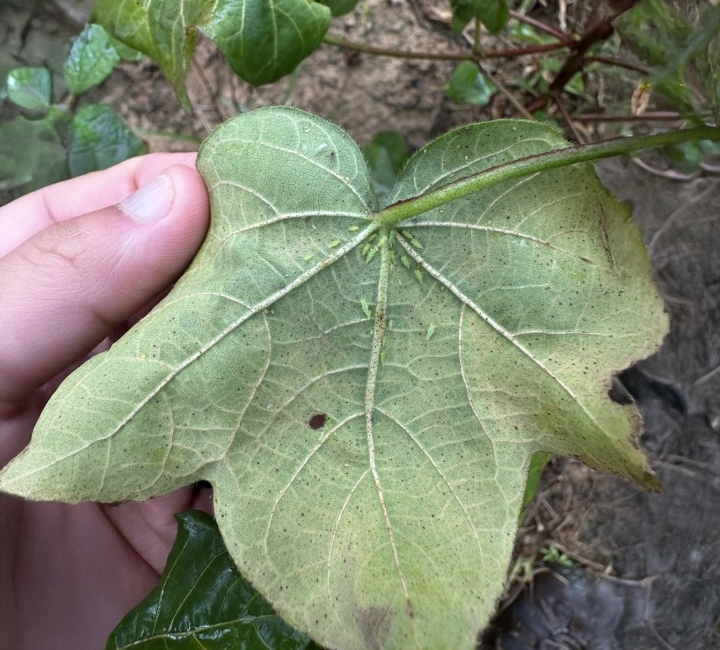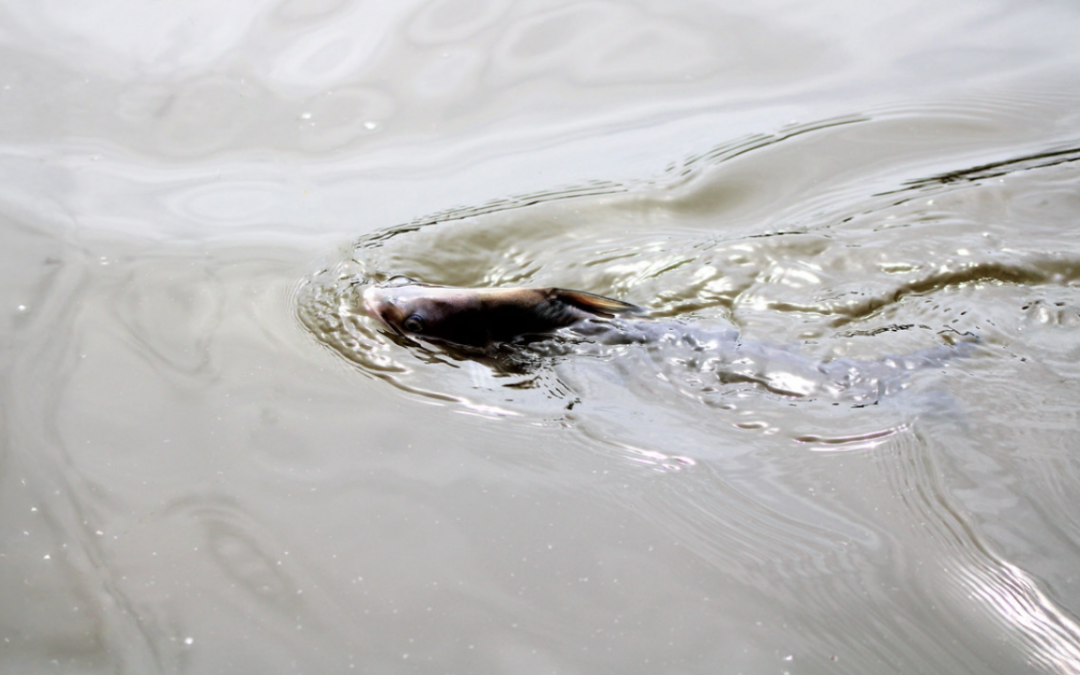The Auburn University Water Resources Center (AUWRC) and Auburn...


The Auburn University Water Resources Center (AUWRC) and Auburn...
In an already stressful and trying growing season, researchers at Auburn University and Alabama Cooperative Extension professionals have confirmed an invasive insect, the two-spot cotton leafhopper, in cotton fields in Alabama. The insect is also commonly known as the...
Scientists at Auburn University are shifting their catfish vaccine development strategy to bring vaccines to farmers. “We are developing more cost-effective killed-bacterin vaccines and exploring new ways to get vaccines to Alabama farmers,” said Timothy Bruce,...

In an already stressful and trying growing season, researchers at Auburn University and Alabama Cooperative Extension professionals have confirmed an invasive insect,...

AU researchers work toward getting orally-delivered vaccines to catfish farmers

The College of Agriculture Scholarship Committee selected Alexandra “Lexie” Hare as the summer 2025 Dean’s Award recipient, recognizing her for academic excellence and...
The Auburn Agricultural Alumni Association will salute five Alabamians who have had a major impact on Alabama agriculture during its 2018 Alabama Agriculture Hall of Honor banquet Thursday, Feb. 8, at the Auburn Marriott Opelika Hotel and Conference Center. Three of...
Auburn University plant pathology professor Kira Bowen’s major scientific accomplishments in the field of plant disease epidemiology have earned her two of the Penn State University College of Agricultural Sciences’ highest honors: a 2017 Outstanding Alumni award and...
By Eddie McGriff McMichen Farm has become the first farm in Alabama to make and break the 100-bushel soybean barrier with just more than 102 bushels per acre. The Cherokee County farm—located near Centre in northeast Alabama—has been in the McMichen family since 1842....
By Paul Hollis Auburn researchers will use an almost $321,000 U.S. Department of Agriculture grant to field-test a novel vaccine that would effectively and economically control one of the most serious bacterial infections in the aquaculture industry today. Columnaris...
By Elina Coneva In a long-term research project, 11 grape varieties tolerant to a dangerous disease threat were planted and evaluated for their suitability to Alabama environmental conditions. The Pierce’s disease-tolerant American and French-American hybrid bunch...
By Derek Herscovici Alabama is home to many pests, and as of 2010 it was introduced to a new one, Halyomorpha halys, a.k.a. the brown marmorated stink bug, or BMSB. Whenever a new species is introduced, this presents the opportunity for research; for entomology grad...
By Paul Hollis The latest numbers tell the irrigation story: In Alabama, only 15 percent of the land currently available for farming is irrigated, a far cry from Mississippi’s 61 percent of cropland and Georgia’s 40 percent. Over time, that lack of irrigation...
Auburn agronomist Trey Cutts, Department of Crop, Soil and Environmental Sciences assistant professor and extension cotton specialist, is one of seven University of Georgia College of Agricultural and Environmental Sciences graduates that the college’s alumni...
Two annual College of Agriculture events that put the spotlight on agriculture in general and Alabama agriculture in particular drew a combined 5,300-plus attendees on back-to-back hot-and-humid Saturdays in September. More than 3,000 of those folks—3,001, to be...
An innovative contract between the College of Agriculture at Auburn University and the International Fertilizer Development Center, or IFDC, Auburn University College of Agriculture Dean Paul Patterson and J. Scott Angle, president and CEO of the International...
By Paul Hollis The seeds for Paul Dyce’s animal science research were planted early in his life, while working on the family farm in Ontario, Canada. “I was raised on a beef cattle farm and was directly involved with developing our heifers,” says the assistant...
By Paul Hollis From a new, high-yielding peanut variety to advanced weapons against a menacing weed species, Auburn University researchers showcased a broad range of their work during Alabama 2nd District Congresswoman Martha Roby’s recent tour of the Wiregrass...
Two faculty members in Auburn University’s College of Agriculture have assumed leadership roles at separate multidisciplinary Alabama Agricultural Experiment Station research, education and development centers on the Auburn campus. Animal sciences associate professor...
Folks of all ages can experience 21st century agriculture firsthand when they head to Auburn University’s E.V. Smith Research Center in Shorter Saturday, Sept. 23, for the sixth annual Ag Discovery Adventure. The free, family-oriented event will run from 9 a.m. to 2...
By Paul Hollis Long-term research is vital to the future of U.S. production agriculture, but farmers can’t always afford to wait for solutions to their most pressing problems. That’s why a new Auburn University funding program is providing shorter-term grants that...
By Paul Hollis The Central Alabama Crops Tour has been an annual happening on the region’s farm scene for just shy of 40 years now, with Auburn University researchers and extension specialists and county and regional agents updating producers on the latest in...
By Jamie Creamer The College of Agriculture has launched a project to establish a highly productive, on-campus teaching garden that will give greater visibility to active agricultural fieldwork at Auburn and enhance the legacy of the historic Old Rotation. Faculty...
Auburn University plant pathology professor Austin Hagan is the 2017 recipient of the American Peanut Research and Education Society’s Coyt T. Wilson Distinguished Service Award. He was presented the award in July during the society’s annual meeting in Albuquerque,...
Zhanjiang “John” Liu—Auburn University’s associate provost and associate vice president for research, and a professor in the School of Fisheries, Aquaculture and Aquatic Sciences—was named a Fellow of the World Aquaculture Society at its annual meeting, held June...
By Paul Hollis A research team led by Auburn University is working to help peanut farmers maintain and improve their production in a changing environment that’s certain to include increasingly limited water resources. “Adequate water availability for all crops is an...
By Paul Hollis By most any standard, a $1.85 return on an initial investment of $1 is a good deal. According to a recent study, that’s what federal investments into agricultural research pay back through additional investments from state, local and private-sector...
The Auburn Agricultural Alumni Association will salute five Alabamians who have had a major impact on Alabama agriculture during its 2018 Alabama Agriculture Hall of Honor banquet Thursday, Feb. 8, at the Auburn Marriott Opelika Hotel and Conference Center. Three of...
Auburn University plant pathology professor Kira Bowen’s major scientific accomplishments in the field of plant disease epidemiology have earned her two of the Penn State University College of Agricultural Sciences’ highest honors: a 2017 Outstanding Alumni award and...
By Eddie McGriff McMichen Farm has become the first farm in Alabama to make and break the 100-bushel soybean barrier with just more than 102 bushels per acre. The Cherokee County farm—located near Centre in northeast Alabama—has been in the McMichen family since 1842....
By Paul Hollis Auburn researchers will use an almost $321,000 U.S. Department of Agriculture grant to field-test a novel vaccine that would effectively and economically control one of the most serious bacterial infections in the aquaculture industry today. Columnaris...
By Elina Coneva In a long-term research project, 11 grape varieties tolerant to a dangerous disease threat were planted and evaluated for their suitability to Alabama environmental conditions. The Pierce’s disease-tolerant American and French-American hybrid bunch...
By Derek Herscovici Alabama is home to many pests, and as of 2010 it was introduced to a new one, Halyomorpha halys, a.k.a. the brown marmorated stink bug, or BMSB. Whenever a new species is introduced, this presents the opportunity for research; for entomology grad...
By Paul Hollis The latest numbers tell the irrigation story: In Alabama, only 15 percent of the land currently available for farming is irrigated, a far cry from Mississippi’s 61 percent of cropland and Georgia’s 40 percent. Over time, that lack of irrigation...
Auburn agronomist Trey Cutts, Department of Crop, Soil and Environmental Sciences assistant professor and extension cotton specialist, is one of seven University of Georgia College of Agricultural and Environmental Sciences graduates that the college’s alumni...
Two annual College of Agriculture events that put the spotlight on agriculture in general and Alabama agriculture in particular drew a combined 5,300-plus attendees on back-to-back hot-and-humid Saturdays in September. More than 3,000 of those folks—3,001, to be...
An innovative contract between the College of Agriculture at Auburn University and the International Fertilizer Development Center, or IFDC, Auburn University College of Agriculture Dean Paul Patterson and J. Scott Angle, president and CEO of the International...
By Paul Hollis The seeds for Paul Dyce’s animal science research were planted early in his life, while working on the family farm in Ontario, Canada. “I was raised on a beef cattle farm and was directly involved with developing our heifers,” says the assistant...
By Paul Hollis From a new, high-yielding peanut variety to advanced weapons against a menacing weed species, Auburn University researchers showcased a broad range of their work during Alabama 2nd District Congresswoman Martha Roby’s recent tour of the Wiregrass...
Two faculty members in Auburn University’s College of Agriculture have assumed leadership roles at separate multidisciplinary Alabama Agricultural Experiment Station research, education and development centers on the Auburn campus. Animal sciences associate professor...
Folks of all ages can experience 21st century agriculture firsthand when they head to Auburn University’s E.V. Smith Research Center in Shorter Saturday, Sept. 23, for the sixth annual Ag Discovery Adventure. The free, family-oriented event will run from 9 a.m. to 2...
By Paul Hollis Long-term research is vital to the future of U.S. production agriculture, but farmers can’t always afford to wait for solutions to their most pressing problems. That’s why a new Auburn University funding program is providing shorter-term grants that...
By Paul Hollis The Central Alabama Crops Tour has been an annual happening on the region’s farm scene for just shy of 40 years now, with Auburn University researchers and extension specialists and county and regional agents updating producers on the latest in...
By Jamie Creamer The College of Agriculture has launched a project to establish a highly productive, on-campus teaching garden that will give greater visibility to active agricultural fieldwork at Auburn and enhance the legacy of the historic Old Rotation. Faculty...
Auburn University plant pathology professor Austin Hagan is the 2017 recipient of the American Peanut Research and Education Society’s Coyt T. Wilson Distinguished Service Award. He was presented the award in July during the society’s annual meeting in Albuquerque,...
Zhanjiang “John” Liu—Auburn University’s associate provost and associate vice president for research, and a professor in the School of Fisheries, Aquaculture and Aquatic Sciences—was named a Fellow of the World Aquaculture Society at its annual meeting, held June...
By Paul Hollis A research team led by Auburn University is working to help peanut farmers maintain and improve their production in a changing environment that’s certain to include increasingly limited water resources. “Adequate water availability for all crops is an...
By Paul Hollis By most any standard, a $1.85 return on an initial investment of $1 is a good deal. According to a recent study, that’s what federal investments into agricultural research pay back through additional investments from state, local and private-sector...